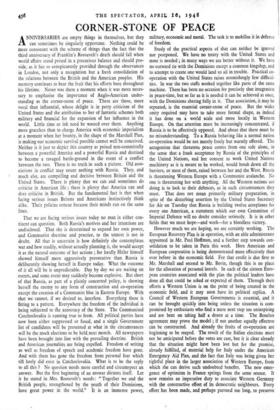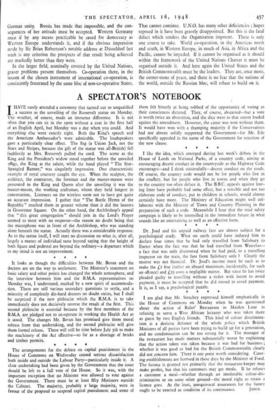CORNER-STONE OF PEACE
ANNIVERSARIES are empty things in themselves, but they can sometimes be singularly opportune: Nothing could be more consonant with the scheme of things than the fact that the third anniversary of Franklin's Roosevelt's death should fall when world affairs stand poised in a precarious balance and should pro- vide, as it has so conspicuously provided through the observances in London, not only a recognition but a fresh consolidation of the relations between the British and the American peoples. His memory continues to bear the fruit that his efforts bore throughout his lifetime. Never was there a moment when it was more neces- sary to emphasise the importance of Anglo-American under- standing as the corner-stone of peace. There are those, more vocal than influential, whose delight is in petty criticism of the United States and the attribution to her of fantastic schemes both military and financial for the expansion of her influence in the world. Little time or ink need be wasted over them. Anything more graceless than to charge America with economic imperialism at a moment-when her bounty, in.the shape of the Marshall Plan, is making our economic survival possible cannot well be conceived. Neither is it just to depict this country as poised non-committally between a powerful America and a powerful Russia and destined to become a ravaged battle-ground in the event of a conflict between the two. There is no truth in such a picture. Old asso- ciations in conflict may count nothing with Russia. They, and much else, are compelling and decisive between Britain and the United States. There is plenty that we can and sometimes do criticise in American life ; there is plenty that America can and does criticise in British. But the fundamental fact is that when facing serious issues Britons and Americans instinctively think alike. Their policies concur because their minds rim on the same lines.
That we are facing serious issues today no man in either con- tinent can question. Both Russia's motives and her intentions are undisclosed. That she is determined to expand her own power, and Communist doctrine and practice, to the utmost is not in doubt. All that is uncertain is how definitely she contemplates war and how readily, without actually planning it, she would accept it as the natural outcome of her actions ; for hardly Hitler himself showed himself more aggressively provocative than Russia is deliberately showing herself in Europe today. What the outcome of it all will be is unpredictable. Day by day we are waiting on events, and some event may suddenly become explosive. But short of that Russia, as part of a plainly concerted policy, is showing herself the enemy to any form of construction and co-operation except the creation of a Communist bloc in Eastern Europe. With that we cannot, if we desired to, interfere. Everything there is fitting to a pattern. Everywhere the freedom of the individual is being subjected to die autocracy of the State. The Communised Czechoslovakia is running true to form. All political parties have now been either suppressed or fused, and a single Government list of candidates will be presented at what in the circumstances will be the mock elections to be hel&next month. All newspapers have been brought into line with the prevailing doctrine. British and American journalists are being expelled. Freedom of writing as well as freedom of speech and academic freedom have gone. And with them has gone the freedom from personal fear which till lately did exist in Czechoslovakia. What is to be the reply to all this ? No question needs more careful and circumspect an answer. But the first beginning of an answer dictates itself. Let it be stated in Mrs. Roosevelt's words: "Together we and the British people, strengthened by the youth of their Dominions, have great power in the world." It is an immense power, military, economic and moral. The task is to mobilise it in defence of freedom.
Study of the practical aspects of that can neither be ignored nor postponed. We have no treaty with the United States and none is needed ; in many ways we are better without it. We have no outward tie with the Dominions except a common kingship, and to attempt to create one would land us all in trouble. Practical co- operation with the United States raises astonishingly few difficul- ties. In war the two staffs worked together like parts of the same machine. There has been no occasion for precisely that integration in peace-time, but so far as it is needed it can be achieved at once, with the Dominions sharing fully in it. That association; it may be repeated, is the essential corner-stone of peace. But the wider unity required may haye to take more formal shape, as indeed it has done on a world scale and more locally in Western Europe. On that attention must be increasingly concentrated, if Russia is to be effectively opposed. And about that there must be no misunderstanding. To a Russia behaving like a normal nation co-operation would be not merely freely but warmly offered. The antagonism that threatens peace comes from one side alone, in the sense that a frank acceptance by Russia.of the principles of the United Nations, and her consent to work United Nations machinery as it is meant to be worked, would break down all the barriers, or most of them, raised between her and the West. Russia is threatening Western Europe with a Communist avalanche. No one is threatening her with anything. All the Western nations are doing is to look to their defences, as in such circumstances they must. That does not mean primarily military preparation, in spite of the disturbing assertion by the United States Secretary for Air on Tuesday that Russia is building twelve aeroplanes for every one American, a statement which our own Committee of Imperial Defence will no doubt consider seriously. It is in other fields that we must hope—and work—for a bloodless victory.
However much we are hoping, we are certainly working. The European Recovery Plan is in operation, with an able administrator appointed in Mr. Paul Hoffman, and a further step towards con- solidation to be taken in Paris this week. Here American and European cooperation is being demonstrated more effectively than ever before in the economic field. For that credit is due first to Mr. Marshall and second to Mr. Bevin, though this is no place for the allocation of personal laurels. In each of the sixteen Euro- pean countries associated with the plan the political leaders have done all that could be asked or expected of them. Through their efforts a Western Union is on the point of being created in the economic field, and it may soon have its political replica. A Council of Western European Governments is essential, and it can be brought quickly into being unless the situation is com- promised by enthusiasts who find a mere next step too uninspiring and are bent on taking half a dozen at a time. The Benelux agreement may prove the model ; if not another equally effective can be constructed. And already the fruits of co-operation are beginning to be reaped. The result of the Italian elections must not be anticipated before the votes are cast, but it is clear already that the situation might have been lost but for the promise, already fulfilled, of material help for Italy under the American Emergency Aid Plan, and the fact that Italy was being given her rightful place in the larger association of Western Europe, from which she can derive such undoubted benefits. The new emer- gence of optimism in France springs from the same source. It now remains an imperative duty to associate Western Germany with the constructive effort of its democratic neighbours. Every effort has been made, and perhaps pursued too long, to preserve German unity. Russia has made that impossible, and the con- sequences of her attitude must be accepted. Western Germany must if by any means practicable be ,saved for democracy as WesPun Europe understands it, and if the obvious impression made by Sir Brian Robertson's notable address at Diisseldorf last week is any criterion the prospects of that result being achieved are markedly better than they were.
In the larger field, nominally covered by the United Nations, graver problems present themselves. Co-operation there, in the bosom of the chosen instrument of international co-operation, is consistently frustrated by the same bloc of non-co-operative States. That cannot continue. U.N.O. has many other deficiencies ; hopes reposed in it have been gravely disappointed. But this is the fatal defect which renders the Organisation impotent. There is only one course to take. World co-operation, in the Americas north and south, in Western Europe, in much of Asia, in Africa and the Pacific, cannot be impeded. If it cannot be organised as it should within the framework of the United Nations Charter it must be organised outside it. And here again the United States and the British Commonwealth must be the leaders. They are, once more, the corner-stone of peace, and there is no fear that the nations. of the world, outside the Russian bloc, will refuse to build on it.































 Previous page
Previous page